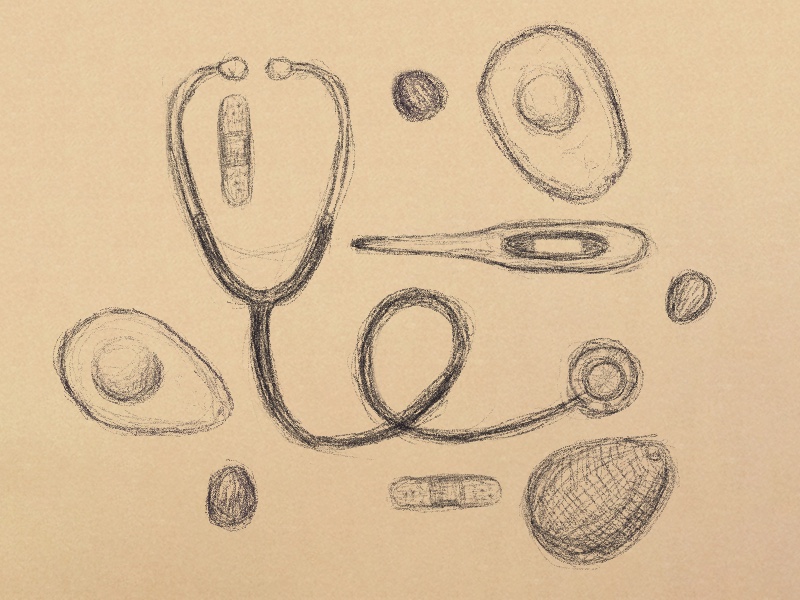By: Fleur Esteron
Myriam Durocher is a postdoctoral researcher at Carleton University in Ottawa, Canada, and at the University of Sydney in Australia. During the 2021 Food Matters and Materialities Conference, Myriam presented her research that challenges how we define, think, and speak of healthy food. I had the opportunity to interview Myriam shortly after she presented at the conference.

Credits: Illustration by Kit Chokly.
FE: Your presentation begins with a screenshot of an article on the Medical News Today website that discusses the 12 potential health benefits of the avocado.* Why did you decide to focus on the avocado?
MD: That’s a very good question because the avocado is just one example among so many that we heard about during the conference. I focused on the avocado because it stood out a lot when I was doing my fieldwork. In my research materials, the avocado was being claimed as being so healthy, while at the same time, I was seeing news articles that were talking about the consequences of avocado mass production in producing countries. The parallel was astonishing. How can we still talk about avocado as healthy food when we see the increased competition in local markets and the emergence of conflicts and violence targeting avocado producers? We’re certainly not thinking about these parties when thinking about healthy food. Seeing that emerging at the same time was just too big to avoid.
FE: During your presentation, you said an interesting word that many of our readers may not have heard before: nutritionism. Could you describe what nutritionism is and how it applies to our understanding of food today?
MD: Certainly. That article from Medical News Today that I referred to during my presentation perfectly represents what nutritionism is. It is an approach to food that is only concerned with food’s nutritional components and properties. It gives the impression that we, as eaters, can act directly on our bodies by ingesting a specific food because it contains a particular nutrient. This approach exaggerates the role of one nutrient in our bodies and doesn’t consider the social, cultural, effective, or environmental dimensions of food and eating. It also doesn’t consider the systemic and structural inequalities that inform health.
FE: Working with the avocado as a “case study”, you talked about what you called healthy food’s effectivities. What do you mean by that?
MD: The concept of effectivities allows me to think of “effects” (such as in “healthy” foods’ effects) in other ways. For instance, we often think about cause-and-effect in nutritional science: if I eat this type of food, I won’t develop this specific disease. This is linked to what we call nutritionism, this particular way of approaching what is “healthy” nowadays. Thinking with this concept of “effectivity” helps me to break out from the linearity of cause-and-effect: it allows me to think differently on the idea of effects. This is because food impacts many different bodies and in many ways.
FE: That’s a great point, Myriam. When we think of what is “healthy”, we often think first of the food’s constitution: is it high in salt? Is it high in sugar? In this way, we only focus on the effects of this food on our bodies. Rarely do we consider how this food might affect other bodies otherwise. Does this link to what you mentioned during your presentation when you said that healthy food effectivities are materialized in racialized bodies?
MD: Yes. In Mexico, for example, there are disastrous social and environmental consequences linked to the massive production of avocado. The demand for avocado in the North, due to its assumed health-related properties, affects the people in producing countries. For example, it’s been observed that there was an increase in pesticide use, which directly affects the farmers who produce avocado since they are in direct contact with the pesticides. This is why I talk about racialized bodies. While health-conscious consumers of the North consume the avocado for its health-related properties, bodies of those producing it in the South are negatively impacted. The increase in demand for avocado in the North directly affects the bodies in the South. And these bodies are forced to submit to the will and desires of the North American consumer.
FE: Thank you for that thought-provoking answer, Myriam. You’re giving our readers and me a lot to consider. The global system shows how connected we all are. Based on your research, how can we, as North American consumers, be more mindful or begin to think of our role in our food systems?
MD: Individuals play a role, but globally speaking, the food system needs to change on a systemic level rather than just an individual level. The way we produce certain knowledge around food and orient our food practices around that is part of it. If we don’t produce food knowledge that will be more conscious of these issues, we’re going to keep reproducing these uneven power dynamics between producing countries in the South and the consuming countries in the North. This is fully linked to our food culture. These practices are tied to the way we understand and approach food at the moment. However, we can begin to think and act on it differently to bring in cultural change and eventually food system-related changes.
FE: Thank you so much, Myriam, for sharing your critically important research with all of us.
*The article is available here.
This interview has been edited for length and clarity.